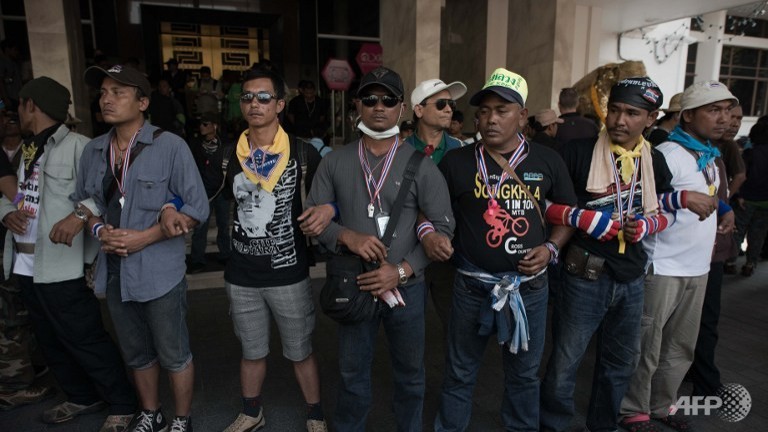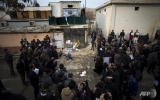Thai govt considers state of emergency amid growing unrest
Update: 20-01-2014 | 00:00:00
The Thai government reiterated on Monday that it was ready to declare a state of emergency if needed, after a weekend of violence in the capital where protesters have been trying for weeks to force Prime Minister Yingluck Shinawatra from power.
 Thai anti-government protesters make a human chain during ongoing protests outside the government savings bank headquarters in Bangkok. (AFP/Nicolas Asfouri)
Yingluck is under intense pressure from demonstrators, backed by the royalist establishment, to step down after more than two months of street rallies aimed at ousting her government from office and installing an unelected "people's council".
Anti-government protesters besieged government offices in the southern provinces on Monday as part of their campaign to bring down the government, officials said.
Demonstrators blocked the entrances to state offices in 12 provinces in the opposition-dominated south to stop civil servants going to work, officials said.
"Protesters locked the gates and asked officials to leave," said Anucha Romayanan, a spokesman for the Centre for Administration of Peace and Order, set up by the government to oversee the handling of the protests.
Protesters also surrounded a government savings bank in Bangkok.
Yingluck has called an election for February but the main opposition party is boycotting the vote. The protesters are seeking to disrupt the polls and have prevented candidates from registering in some southern constituencies.
The demonstrators have staged a self-styled "shutdown" of Bangkok since January 13, erecting roadblocks and rally stages at several key intersections in the city, although the number of protesters has steadily fallen since the middle of last week.
The mass rallies in Bangkok have sparked several bouts of violence, including grenade attacks and shootings.
Dozens of people were wounded and one killed in grenade attacks by unknown assailants on opposition rallies on Friday and Sunday that heightened fears of growing unrest ahead of next month's election.
Deputy Prime Minister Surapong Tovichakchaikul said on Monday that the government might declare a state of emergency to give a bigger role to the army to help deal with the unrest.
"We cannot allow more violence to happen," he said.
The kingdom has been periodically rocked by political bloodshed since former Prime Minister Thaksin Shinawatra, Yingluck's older brother, was overthrown by royalist generals in a coup seven years ago.
The latest protests were triggered by a failed amnesty bill that could have allowed Thaksin to return without going to jail for a past corruption conviction.
The demonstrators accuse the billionaire telecoms tycoon-turned-politician of controlling his sister's government from his base in Dubai.
Thaksin has strong electoral support in northern Thailand, but he is reviled by many southerners, Bangkok's middle class and members of the royalist establishment.
CNA
Thai anti-government protesters make a human chain during ongoing protests outside the government savings bank headquarters in Bangkok. (AFP/Nicolas Asfouri)
Yingluck is under intense pressure from demonstrators, backed by the royalist establishment, to step down after more than two months of street rallies aimed at ousting her government from office and installing an unelected "people's council".
Anti-government protesters besieged government offices in the southern provinces on Monday as part of their campaign to bring down the government, officials said.
Demonstrators blocked the entrances to state offices in 12 provinces in the opposition-dominated south to stop civil servants going to work, officials said.
"Protesters locked the gates and asked officials to leave," said Anucha Romayanan, a spokesman for the Centre for Administration of Peace and Order, set up by the government to oversee the handling of the protests.
Protesters also surrounded a government savings bank in Bangkok.
Yingluck has called an election for February but the main opposition party is boycotting the vote. The protesters are seeking to disrupt the polls and have prevented candidates from registering in some southern constituencies.
The demonstrators have staged a self-styled "shutdown" of Bangkok since January 13, erecting roadblocks and rally stages at several key intersections in the city, although the number of protesters has steadily fallen since the middle of last week.
The mass rallies in Bangkok have sparked several bouts of violence, including grenade attacks and shootings.
Dozens of people were wounded and one killed in grenade attacks by unknown assailants on opposition rallies on Friday and Sunday that heightened fears of growing unrest ahead of next month's election.
Deputy Prime Minister Surapong Tovichakchaikul said on Monday that the government might declare a state of emergency to give a bigger role to the army to help deal with the unrest.
"We cannot allow more violence to happen," he said.
The kingdom has been periodically rocked by political bloodshed since former Prime Minister Thaksin Shinawatra, Yingluck's older brother, was overthrown by royalist generals in a coup seven years ago.
The latest protests were triggered by a failed amnesty bill that could have allowed Thaksin to return without going to jail for a past corruption conviction.
The demonstrators accuse the billionaire telecoms tycoon-turned-politician of controlling his sister's government from his base in Dubai.
Thaksin has strong electoral support in northern Thailand, but he is reviled by many southerners, Bangkok's middle class and members of the royalist establishment.
CNA
 Thai anti-government protesters make a human chain during ongoing protests outside the government savings bank headquarters in Bangkok. (AFP/Nicolas Asfouri)
Yingluck is under intense pressure from demonstrators, backed by the royalist establishment, to step down after more than two months of street rallies aimed at ousting her government from office and installing an unelected "people's council".
Anti-government protesters besieged government offices in the southern provinces on Monday as part of their campaign to bring down the government, officials said.
Demonstrators blocked the entrances to state offices in 12 provinces in the opposition-dominated south to stop civil servants going to work, officials said.
"Protesters locked the gates and asked officials to leave," said Anucha Romayanan, a spokesman for the Centre for Administration of Peace and Order, set up by the government to oversee the handling of the protests.
Protesters also surrounded a government savings bank in Bangkok.
Yingluck has called an election for February but the main opposition party is boycotting the vote. The protesters are seeking to disrupt the polls and have prevented candidates from registering in some southern constituencies.
The demonstrators have staged a self-styled "shutdown" of Bangkok since January 13, erecting roadblocks and rally stages at several key intersections in the city, although the number of protesters has steadily fallen since the middle of last week.
The mass rallies in Bangkok have sparked several bouts of violence, including grenade attacks and shootings.
Dozens of people were wounded and one killed in grenade attacks by unknown assailants on opposition rallies on Friday and Sunday that heightened fears of growing unrest ahead of next month's election.
Deputy Prime Minister Surapong Tovichakchaikul said on Monday that the government might declare a state of emergency to give a bigger role to the army to help deal with the unrest.
"We cannot allow more violence to happen," he said.
The kingdom has been periodically rocked by political bloodshed since former Prime Minister Thaksin Shinawatra, Yingluck's older brother, was overthrown by royalist generals in a coup seven years ago.
The latest protests were triggered by a failed amnesty bill that could have allowed Thaksin to return without going to jail for a past corruption conviction.
The demonstrators accuse the billionaire telecoms tycoon-turned-politician of controlling his sister's government from his base in Dubai.
Thaksin has strong electoral support in northern Thailand, but he is reviled by many southerners, Bangkok's middle class and members of the royalist establishment.
CNA
Thai anti-government protesters make a human chain during ongoing protests outside the government savings bank headquarters in Bangkok. (AFP/Nicolas Asfouri)
Yingluck is under intense pressure from demonstrators, backed by the royalist establishment, to step down after more than two months of street rallies aimed at ousting her government from office and installing an unelected "people's council".
Anti-government protesters besieged government offices in the southern provinces on Monday as part of their campaign to bring down the government, officials said.
Demonstrators blocked the entrances to state offices in 12 provinces in the opposition-dominated south to stop civil servants going to work, officials said.
"Protesters locked the gates and asked officials to leave," said Anucha Romayanan, a spokesman for the Centre for Administration of Peace and Order, set up by the government to oversee the handling of the protests.
Protesters also surrounded a government savings bank in Bangkok.
Yingluck has called an election for February but the main opposition party is boycotting the vote. The protesters are seeking to disrupt the polls and have prevented candidates from registering in some southern constituencies.
The demonstrators have staged a self-styled "shutdown" of Bangkok since January 13, erecting roadblocks and rally stages at several key intersections in the city, although the number of protesters has steadily fallen since the middle of last week.
The mass rallies in Bangkok have sparked several bouts of violence, including grenade attacks and shootings.
Dozens of people were wounded and one killed in grenade attacks by unknown assailants on opposition rallies on Friday and Sunday that heightened fears of growing unrest ahead of next month's election.
Deputy Prime Minister Surapong Tovichakchaikul said on Monday that the government might declare a state of emergency to give a bigger role to the army to help deal with the unrest.
"We cannot allow more violence to happen," he said.
The kingdom has been periodically rocked by political bloodshed since former Prime Minister Thaksin Shinawatra, Yingluck's older brother, was overthrown by royalist generals in a coup seven years ago.
The latest protests were triggered by a failed amnesty bill that could have allowed Thaksin to return without going to jail for a past corruption conviction.
The demonstrators accuse the billionaire telecoms tycoon-turned-politician of controlling his sister's government from his base in Dubai.
Thaksin has strong electoral support in northern Thailand, but he is reviled by many southerners, Bangkok's middle class and members of the royalist establishment.
CNA
 Malaysia's digital economy projected to reach 31 billion USD in 2024
Malaysia's digital economy projected to reach 31 billion USD in 2024
 Opportunity to enhance the position of the Global South
Opportunity to enhance the position of the Global South
 Thailand to build new bridge to Cambodia
Thailand to build new bridge to Cambodia
 Bulgaria charts new course with Vietnam on President’s upcoming visit: Diplomat
Bulgaria charts new course with Vietnam on President’s upcoming visit: Diplomat
 Seminar seeks ways to boost ASEAN - Latin America connectivity
Seminar seeks ways to boost ASEAN - Latin America connectivity
 Indonesia seeks India's help in health education
Indonesia seeks India's help in health education
 Indonesia named world's most generous country in 2024
Indonesia named world's most generous country in 2024
 Philippines: Over-4m-high floodwaters make thousands of houses submerged
Philippines: Over-4m-high floodwaters make thousands of houses submerged
 Singapore’s public sector records carbon reduction in 2023
Singapore’s public sector records carbon reduction in 2023
 Pressure facing the EU on its growth track
Pressure facing the EU on its growth track



